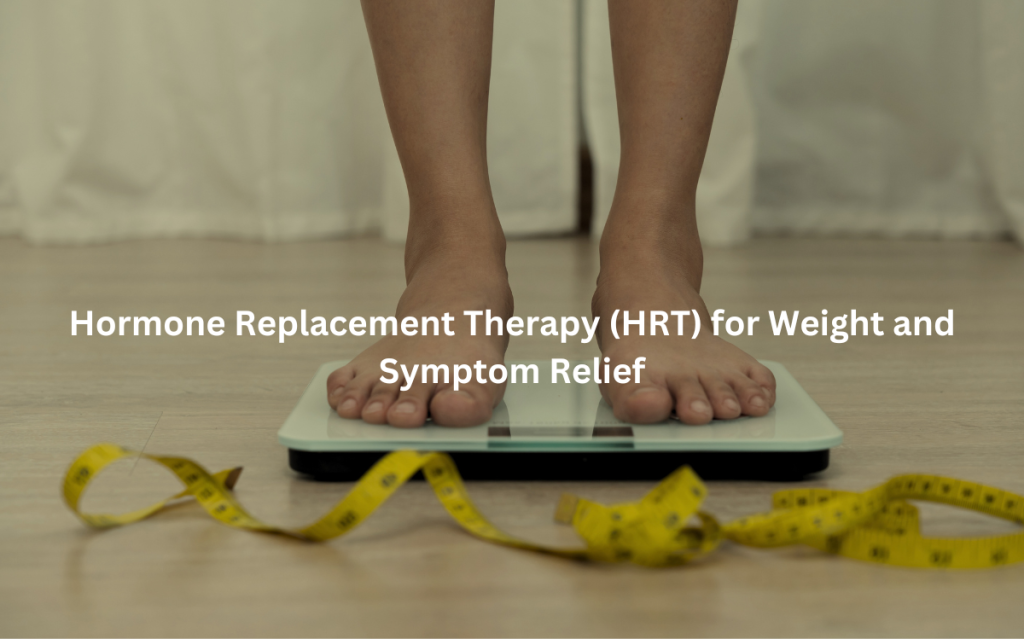Tackle menopause weight gain with practical diet, exercise, and hormone strategies to reclaim your health and energy.
Menopause weight gain is a common struggle, but it doesn’t have to be overwhelming. As estrogen levels drop, your body undergoes changes that affect metabolism, fat distribution, and muscle mass, leading to weight gain—especially around the belly. (1)
Understanding these shifts can help you manage your weight more effectively with the right strategies.
Key Takeaways
- Hormonal Changes Matter: Estrogen reduction can lead to fat gain and muscle loss, but exercise and diet can mitigate these effects.
- Strength Training Is Key: Building muscle with regular strength training can boost metabolism and reduce belly fat.
- Healthy Lifestyle Over Fad Diets: A balanced diet, along with regular physical activity, is the best approach to sustainable weight management during menopause.
Menopause Weight Gain: Why It Happens
Menopause often brings unexpected changes, and weight gain is one of the most frustrating. As oestrogen levels decline, the body undergoes significant shifts that can lead to extra pounds, especially around the abdomen.
The key reasons behind menopausal weight gain include:
- Declining oestrogen levels: Oestrogen helps regulate metabolism and fat distribution. When levels drop, the body burns fewer calories and stores more fat, particularly in the abdominal area.
- Muscle loss with age: Muscle mass naturally decreases over time, and since muscle burns more calories than fat, this leads to a slower metabolism.
- Fat redistribution: Oestrogen typically helps prevent fat from accumulating around the midsection. Without it, fat tends to settle in the belly, leading to that stubborn middle-age spread.
These changes aren’t just cosmetic—they’re biological processes influenced by hormones. Women often notice their once-toned bodies becoming softer, particularly around the waist, even if their eating habits haven’t changed.
While this shift can feel discouraging, it’s also a reminder to adopt lifestyle changes. Focusing on strength training, a balanced diet, and overall health can help counteract the effects of menopause and keep weight gain under control.
Dietary Recommendations for Menopausal Weight Management
Managing weight during menopause requires a focus on balanced nutrition rather than just cutting calories. The body’s needs shift during this phase, so providing the right fuel is essential for both weight control and overall health.
A balanced diet should include:
- Fresh fruits and vegetables: Nutrient-dense and low in calories, these are ideal for weight management and provide essential vitamins.
- Fibre-rich foods: Found in whole grains, legumes, and vegetables, fibre supports digestion and helps you feel full longer.
- Healthy fats: Sources like avocados, nuts, seeds, and olive oil promote satiety and overall well-being.
While trendy diets like keto or intermittent fasting may seem appealing, they’re not always sustainable or suitable for menopausal women. These restrictive approaches can lead to nutrient deficiencies, which can worsen symptoms or health issues.
Calcium and vitamin D are particularly important during menopause to support bone health as oestrogen levels decline. Instead of focusing on fad diets, it’s better to build sustainable eating habits centred on nutrient-rich foods.
Supplements can also complement a healthy diet. Common recommendations include:
- Vitamin D and calcium: Essential for maintaining bone density.
- Iron: Helps prevent fatigue and supports immune function.
- Iodine: Supports thyroid health, which may be affected by hormonal changes.
Ultimately, long-term, sustainable dietary changes—paired with regular physical activity—are the most effective way to manage weight and enhance overall health during menopause. (2)
Exercise Strategies to Manage Weight During Menopause
Exercise plays a vital role in weight management during menopause, complementing dietary efforts to counteract a slowing metabolism. Gradual and consistent changes, rather than intense or abrupt workouts, are key to long-term success.
Strength training is one of the most effective strategies. During menopause, muscle mass naturally declines, but strength exercises help preserve and rebuild it. Increased muscle mass boosts metabolism, enabling the body to burn more calories, even at rest. Strength training doesn’t have to involve heavy weights—options like:
- Bodyweight exercises (e.g., squats, push-ups)
- Resistance bands
- Light dumbbells
…can be highly effective.
Aerobic activities, such as brisk walking, swimming, or cycling, are equally important. These exercises help burn fat while improving cardiovascular health. Since the risk of heart disease rises post-menopause, maintaining heart health through regular aerobic exercise is essential.
Consistency is crucial. Extreme diets or short-lived workout regimens may yield temporary results but are unlikely to provide lasting benefits. A balanced routine that combines strength and aerobic exercises, performed regularly, delivers sustainable weight management and improved overall health.
Hormone Replacement Therapy (HRT) for Weight and Symptom Relief

Hormone Replacement Therapy (HRT) is one of the most common treatments for managing menopausal symptoms, including weight gain. HRT works by replenishing the estrogen and sometimes progesterone that the body no longer produces.
This can ease symptoms like hot flashes, night sweats, and mood swings. For some women, HRT can also help with weight management by stabilizing hormone levels that affect metabolism.
However, HRT isn’t without its risks. It can increase the risk of blood clots, breast cancer, and stroke, especially when taken long-term. It’s crucial that women consult their healthcare providers to understand the potential risks and benefits based on their personal health history.
For those who prefer not to use HRT, there are alternatives. Non-hormonal options like supplements, stress management techniques, and even certain antidepressants may help alleviate menopausal symptoms.
Lifestyle changes—like a healthy diet and regular exercise—should still be the foundation of weight management during menopause.
Managing Belly Fat Specifically During Menopause
If there’s one thing that annoys women more than anything about menopause, it’s the stubborn belly fat. So, how do you deal with it? First, understand that it’s a result of hormonal changes, and it’s common. But don’t let it settle in.
To target belly fat, a combination of core-strengthening exercises and full-body workouts is key. Planks, crunches, and other abdominal exercises can help tighten and tone the area, but they won’t necessarily burn the fat.
For that, you need a holistic approach that includes aerobic exercise and strength training to promote fat loss and build muscle.
Adjusting your lifestyle is also crucial. That means making dietary changes, such as reducing sugar and processed foods, which can contribute to fat accumulation in the abdomen. More fruits, vegetables, and fiber will help maintain a healthy weight and support overall health.
Long-Term Health Risks: Cardiovascular and Bone Health
While managing weight during menopause is important, it’s just as crucial to focus on long-term health risks that increase during this time. Two of the most concerning health risks for women during menopause are cardiovascular disease and osteoporosis.
Heart disease risk increases after menopause due to the decline in estrogen. Estrogen has protective effects on the heart, and without it, women are at a higher risk of developing heart problems.
To reduce this risk, it’s important to focus on a heart-healthy lifestyle, which includes a balanced diet, regular exercise, and stress management.
Osteoporosis is another significant concern. As estrogen levels drop, bone density decreases, making bones more fragile and prone to fractures. Weight-bearing exercises, such as walking, jogging, or lifting weights, can help maintain bone strength. Calcium and vitamin D supplements are also important for bone health.
Mental and Emotional Health During Menopause
Menopause isn’t just about physical changes; mental and emotional health can be affected too. Mood swings, anxiety, and depression are common during menopause, and they can make weight management even more challenging.
Cognitive Behavioral Therapy (CBT), relaxation techniques, and mindfulness practices can help manage stress and improve emotional well-being. These approaches can be especially useful for women experiencing mood swings or anxiety, which are not uncommon during this time.
It’s crucial to address mental health during menopause. A holistic approach that includes managing both physical and emotional symptoms will lead to a healthier, more balanced life during this transition.
When to Seek Professional Help for Weight Gain and Symptoms
If weight gain and menopausal symptoms become unmanageable, it might be time to seek professional help. Women should consult their healthcare provider if they notice persistent symptoms, like severe weight gain, hot flashes, or mood swings, that interfere with daily life.
Healthcare providers can offer personalized treatment plans, including HRT, alternative therapies, and lifestyle adjustments. Health Canada provides guidelines for managing menopause, ensuring that women receive the appropriate care during this time.
Final Thoughts
Menopause can feel like a wild ride, and the weight gain that often accompanies it is just one of the many changes women face.
But by understanding the reasons behind weight gain, making mindful dietary choices, staying active, and focusing on long-term health, women can successfully manage their weight and overall well-being during this stage of life. It’s not about perfection—it’s about creating sustainable, positive changes that work for the body at this stage of life.
If weight gain during menopause is a concern, book a consultation with Modern Menopause to get personalised support and expert guidance on managing your health effectively. Book here.
FAQ
1. What causes weight gain during menopause?
Weight gain during menopause is primarily linked to hormonal changes, particularly the decline in estrogen levels. This hormone shift leads to fat accumulation around the abdomen. Additionally, a decrease in muscle mass slows down metabolism, making it easier to gain weight. Stress, lack of sleep, and lifestyle factors also contribute to this challenge, making weight management more difficult during this life stage.
2. How can I manage weight gain during menopause?
Managing weight gain during menopause involves focusing on a balanced diet and regular exercise. Strength training helps preserve muscle mass and boosts metabolism, while aerobic exercise aids in calorie burning. Avoid extreme diets and aim for gradual changes, such as reducing portion sizes, eating more fruits and vegetables, and cutting down on alcohol. A steady, realistic approach is key.
3. Are there specific foods that can help manage menopause weight gain?
Foods rich in fiber, healthy fats, and protein can help manage weight gain during menopause. Incorporating fruits, vegetables, whole grains, and oily fish into your diet provides essential nutrients and helps stabilize blood sugar levels. Avoid processed foods, sugar, and excessive alcohol, as they can exacerbate weight gain and worsen menopause symptoms like hot flashes.
4. Do supplements help with menopause weight gain?
Supplements like vitamin D may be beneficial during menopause, especially for bone health, but they won’t directly impact weight. It’s crucial to prioritize a well-rounded diet to ensure you’re getting enough calcium, iron, and B vitamins. If considering supplements, always consult with a healthcare professional to avoid deficiencies and ensure they complement your lifestyle changes.
5. How does exercise help with menopause weight gain?
Exercise, especially strength training, is crucial during menopause. It helps maintain muscle mass, which naturally decreases with age, and boosts metabolism, making weight management easier. Aerobic exercises, like walking or cycling, also burn calories and improve heart health. Regular physical activity can help mitigate many menopause symptoms, including weight gain, while enhancing overall well-being.
References
- https://www.mayoclinic.org/healthy-lifestyle/womens-health/in-depth/menopause-weight-gain/art-20046058
- https://pmc.ncbi.nlm.nih.gov/articles/PMC8373626/

Leave a Reply